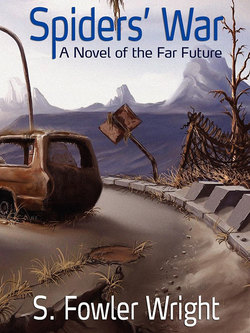Читать книгу Spiders' War - S. Fowler Wright - Страница 3
На сайте Литреса книга снята с продажи.
ОглавлениеPROLOGUE: INTERVIEW WITH A MAGICIAN
“It is a long while,” the magician said, “since you were here. I had supposed that your last adventure had been enough, even for you.”
Marguerite Cranleigh, who, whether the time had been long or short, looked little older than when she had bargained first for the acquaintance of distant days, gave a smiling reply: “It was exciting enough. But I cannot live in past days. I must ask you this: when I went into a far time, there was one whom I knew well. If I should go again into some distant time, could I meet him again?”
“It would not be beyond possibility.”
“And could it be at a future day, rather than one which is past? You can see that I should prefer that, if it would not be beyond your power to control.”
“Why should it? Between past and future there is no difference at all.”
“You mean that they are equally easy for you?”
“I mean what I say. Past and present and future—they are all one. They are like the rotundity of the earth, which is not limitless, but has neither beginning nor end. You can move upon it, as I have moved you in time, but you cannot properly say that you go forward or back.”
“All the same, you know what I mean.”
“So I do. Some things are harder to explain than to understand.”
“Then it is for that I will ask. And I should prefer a less primitive time than I had before.”
“You mean a less primitive place. There have been no periods in the whole history of civilized or semi-civilized man when they have not been both orderly and savage parts of the earth, as there are today, although movement is the special development, as it must be the disintegrating factor, of the civilization to which we belong.”
“A time when movement will be less worshiped would please me well. But there is another thing I would ask, though with little hope.”
“Few things are beyond hope. What is it?”
“It is that, when I am in that far time, I may remember what I am here.”
“You ask much. Have you other desires beyond that?”
“I would ask to remain, if the one of whom I speak should be there.”
“So you could, while that life will last. But after that, you must return here, and find that you are in the same time as before.”
“But it will not be the same, for another memory will be mine.”
“You see gain in that? Well, so perhaps it may be. It is with yourselves.”
“Yes. I see that.”
“Even so, you may be asking more than I can certainly pledge. When you were translated before, you went into the past, and returned with memories which were easy to keep. But, if you are resolved to enter a future time, I cannot promise that you will bring back a memory of that which will not have occurred.”
“But I thought you said—” she exclaimed, in some natural astonishment, and was interrupted by: “I have said too much.”
He became practical, remembering the rent of the Bond Street suite in which this interview was taking place, and that the present was the only tense which its landlord would understand. He asked: “Have you brought a check?”
Yes, she had done that.
